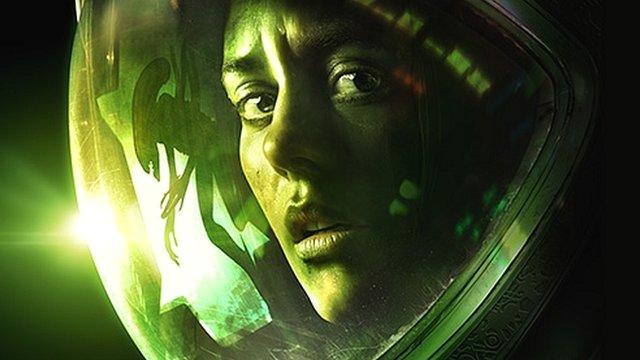E3: How No Man's Sky took on the games industry - and won
- Published
Dave Lee asks the creator of No Man's Land how a seven-man team is creating a galaxy-sized game
The Hello Games team doesn't have a stand at E3.
No flashing lights, no pounding music, no booth babes.
But boy, has it stolen the show.
Its game, No Man's Sky - an "open world" science -fiction game title - has arguably generated more buzz than any other title on show here in Los Angeles.
Shown on-screen as part of Sony's PlayStation press conference earlier this week, it had the audience cheering - and other developers looking on with envy.
Because unlike the other titles lavished with that kind of attention, this isn't a game created by hundreds of people for millions of dollars.
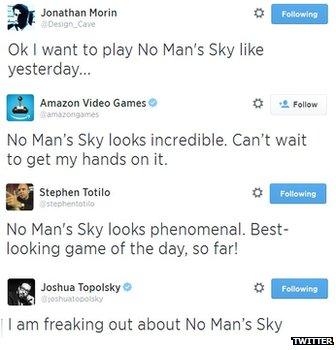
The creator of Watch Dogs, Amazon's games unit, the editor-in-chief of games news site Kotaku and the founder of The Verge have all raved about No Man's Sky
Rather, No Man's Sky began its life in a makeshift office above a tile shop in Guildford, a town just outside London.
"It's absolutely insane," laughs Sean Murray, Hello Games' co-founder, in an interview with the BBC.
"We were on stage for about five or six minutes. Pretty much the only other people who got that were teams of hundreds. Hello Games in total is 10 people, with just a handful working on No Man's Sky."
'Fun' flood
Back in December, with the team now working out of a glorified shed, the glitz of E3 felt a long way away for Hello Games.
"Guildford and a lot of the UK was super-badly flooded. We lost all of our equipment, it pretty much wiped out the office. It was Christmas Eve.
"Christmas day we were there just chucking everything out and starting again. We'd lost so much."
"But this team, we love crisis and problems. We all banded together. I shouldn't say this, but in a weird way it's sort of fun - or at least it's part of the journey, part of the adventure."
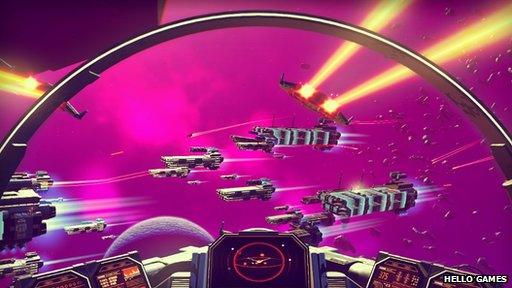
When not exploring newly discovered worlds, gamers can also engage in space battles
Competitive creators
The level of competitiveness in trying to secure exclusive titles from independent developers is heating up, as Sony and Microsoft are both desperate to be seen as the place to be for indies.
Chris Charla heads up Microsoft's ID@Xbox programme.
IDs - standing for independent developers - are a major fixture on the Xbox stand, with just under 40 titles available to play.
But No Man's Sky is an obvious sore point for Mr Charla.
"I think No Man's Sky is a really really cool looking game," he says, through gritted teeth.
"I'm excited to play it."
He refuses to be drawn on whether his team was frustrated that it would appear on PS4 first.
"I think they're a fantastic developer."
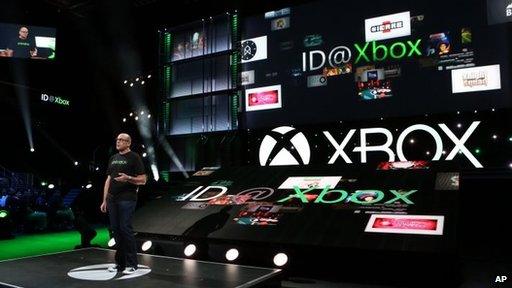
Mr Charla highlighted dozens of indie titles at the Xbox One's E3 event
Shelf Life
Microsoft and Sony both like to paint their eagerness to empower indie developers as an almost charitable effort.
But in truth, says Ovum analyst Paul Jackson, it's very serious business.
"Indie games are quick to develop," he says. "And Microsoft and Sony need next-gen titles."
Many of the biggest games coming up on the consoles won't be on the shelves until 2015 - something of an issue in the run up to Christmas.
Indies provide a trendy way to plug the gap.
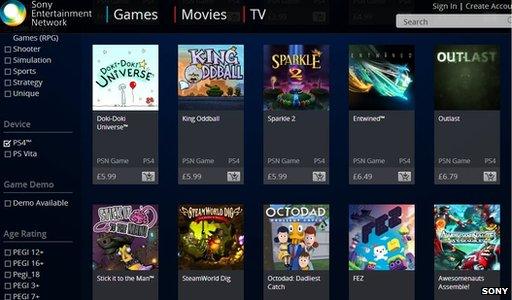
Many of the games in the new consoles' online stores were released by the indies
"They need to add to the number of games that are available, and make a healthy release pipeline for this year" Mr Jackson says.
Microsoft's Mr Charla acknowledges that indies do help make online store shelves stay fresh.
"To us it's really important that when someone turns on their Xbox One, they see new content, they see a broad array of content, and they see a really diverse array of content."
Whatever the motives, Mr Jackson argues that gamers are the eventual winners - as indie developers dare to break ground the more risk-averse publishers would never dream of getting near.
Sensible soccer
Perhaps the embodiment of that attitude is Frank Cifaldi from indie outfit Other Ocean.
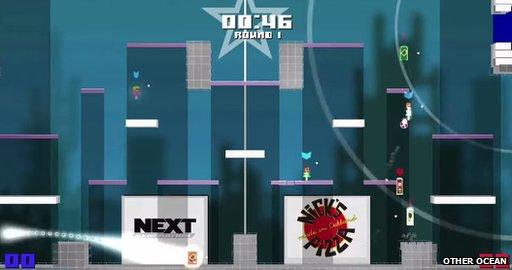
#IDARB's is described as a chaotic eight-player e-sport jumping jetpack arena ball game
Standing beside his spot on the Xbox stand, he is showing off his studio's game, #IDARB.
The game can be played by eight people at once, around one screen, and the aim is to simply fire a ball into an opponent's net, like football.
The game has echoes of the epically playable Sensible Soccer series, a world away from the painstaking simulation of the Fifa series.
The hashtag in #IDARB isn't a corny marketing ploy - the game has a terrifically unique social media tie-in.
Each match played on the game has a unique code. Anyone in the world can send a tweet with that code and activate bizarre actions to take place in the game.
WATCH: BBC's Richard Taylor takes a tour of the new indie games at E3
"Could you imagine this game on PlayStation 2? Could you imagine buying this in a store? There was no way to sell it," says Mr Cifaldi.
"It's not like no-one wanted this stuff, it was just that your only option for selling a game was in a box.
"We're free to do this now."
Enormous
It's easy to group indie games as being titles that are small, quirky, fun - or even just nostalgic.
In that regard, No Man's Sky is a game changer.
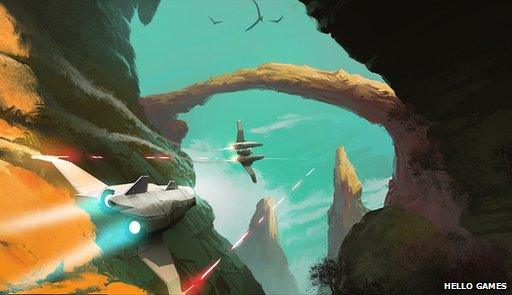
As this concept arts shows, the intention is that the final game will allow players to chase each other through canyons
Alongside the multi-million dollar budgets of the biggest titles like Call of Duty and Assassin's Creed, No Man's Sky does not look like an indie game.
Rather than hire huge teams to painstakingly create levels, and worlds, that take months and years to build, the Hello Games team has instead put its efforts into creating a system that is essentially able to generate highly complex worlds itself.
"We're trying to do it procedurally," explains Mr Murray, "using next-gen consoles and PCs to make that content for us, and make that process easier. Once that constraint is removed we're a lot freer."
The game is about exploration, and the procedural world-building technology means that when you fly out into the distance, you're covering ground never before seen by anyone else playing the game.
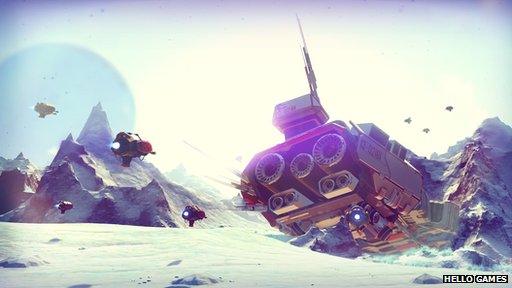
Hello Games has yet to confirm a release date for No Man's Sky
In Sony's media suite at E3, the BBC finds Shahid Ahmad. As Sony's lead for independent games in Europe, he looks like a man who has just discovered buried treasure.
"No Man's Sky is an enormous deal," he says.
"Infinite, you could say. It's one of the most inspirational titles that we've seen.
"For me No Man's Sky evokes the hope of sci-fi, and the pioneering spirit. It's a great story. We're absolutely delighted."
Now, it's all down to the Hello Games team to get the game finished.
No pressure, chaps.
- Published12 June 2014
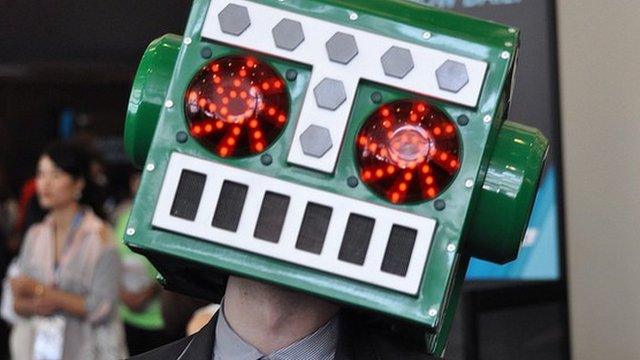
- Published11 June 2014

- Published11 June 2014

- Published11 June 2014

- Published11 June 2014
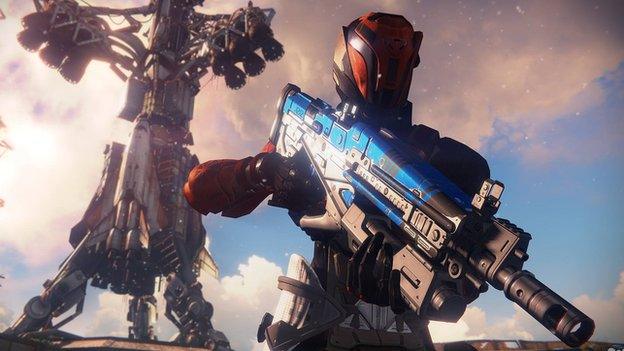
- Published10 June 2014
